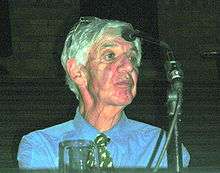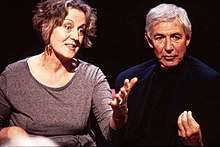Lewis Wolpert
Lewis Wolpert CBE FRS FRSL FMedSci (born 19 October 1929) is a South African-born British developmental biologist, author, and broadcaster. Wolpert is recognized for his work on the intracellular positional information that guides cellular development. In addition, he has published several popular science books.
Lewis Wolpert | |
|---|---|
 | |
| Born | 19 October 1929 South Africa |
| Nationality | British |
| Education | BSc, PhD |
| Alma mater | University of Witwatersrand Imperial College London King's College London |
| Known for | positional-value concept in biological development |
| Children | Daniel Mark Wolpert |
| Awards | Hamburger prize for education – American Soc.Dev.Biol. Michael Faraday Prize (2000) Royal Medal (2018) |
| Scientific career | |
| Doctoral students | Jim Smith[1][2] |
| Website | www |
Career
Wolpert was born into a South African Jewish family of Lithuanian Jewish origin.[3] He was educated at the University of Witwatersrand (BSc), at Imperial College London, and at King's College London (PhD). As of 2010 he holds the position of Emeritus Professor of Biology as applied to Medicine in the Department of Anatomy and developmental biology at University College London.
Biologists recognise Wolpert for elaborating and championing the ideas of positional information and positional value: molecular signals and internal cellular responses to them that enable cells to do the right thing in the right place during embryonic development. The essence of these concepts is that there is a dedicated set of molecules for spatial co-ordination of cells, identical across many species and across different developmental stages and tissues. The discovery of Hox gene codes in flies and vertebrates has largely vindicated Wolpert's positional-value concept, while identification of growth-factor morphogens in many species has supported the concept of positional information.
In addition to his scientific and research publications, he has written about his own experience of clinical depression in Malignant Sadness: The Anatomy of Depression (1999). He presented three television programmes based on the book and entitled A Living Hell on BBC2. He was made a Fellow of the Royal Society in 1980 and awarded the CBE in 1990. He became a Fellow of the Royal Society of Literature in 1999 and one of the first Fellows of the Academy of Medical Sciences in 1998. He serves as a Vice-President of Humanists UK. In 1986 Wolpert was invited to deliver the Royal Institution Christmas Lecture on Frankenstein's Quest: Development of Life. In 2018 he received the Royal Medal. [4]
Ideas
In a 2005 article entitled "Spiked", The Guardian asked a series of scientists "What is the one thing everyone should learn about science?" Wolpert responded:
I would teach the world that science is the best way to understand the world, and that for any set of observations, there is only one correct explanation. Also, science is value-free, as it explains the world as it is. Ethical issues arise only when science is applied to technology – from medicine to industry.[5]
Of his book How We Live & Why We Die: The Secret Lives of Cells, Wolpert said the intended audience of his book was the general public. He said he thought the general public needed to understand that people are a society of cells, particularly if they wanted to understand humans.[6]
Wolpert also believes that one very important and so far unsolved question in cellular research is the origins and evolution of the first cell, as well as the question of cell behavior, which in his opinion would be useful for the study of illnesses such as cancer or Alzheimer's disease.[6]
Wolpert has debated Christian philosopher William Lane Craig about the existence of God,[7] Christian astrophysicist Hugh Ross on whether there is a case for a creator, and William Dembski on the topic of intelligent design. In a lecture entitled "Is Science Dangerous?",[8] he expanded on this: "I regard it as ethically unacceptable and impractical to censor any aspect of trying to understand the nature of our world."
On 25 May 1994, Wolpert conducted an hour-long interview with Francis Crick called "How the Brain 'sees'" for The Times Dillon Science Forum; Just Results Video Productions produced a video of the interview for The Times. On 15 January 2004, Wolpert and biologist/parapsychologist Rupert Sheldrake engaged in a live debate regarding the evidence for telepathy. It took place at the Royal Society of Arts in London.[9] Wolpert also disagreed with Sheldrake regarding the possibility of putting a cell or an embryo onto a computer, which Wolpert believed would be attainable within the following 20 years. He believes doing so would predict in detail how the cell will behave, although he also admits to the difficulty of this task due to the complex networks of proteins, protein-to-protein interactions, and the vast amount of molecules in the cell.[6]
In the late 1960s Wolpert proposed the illustrative French flag model, which explains how signalling between cells early in morphogenesis could be used to inform cells with the same genetic regulatory network of their position and role.
He is credited with the famous quote: "It is not birth, marriage, or death, but gastrulation which is truly the most important time in your life."[10]
Wolpert has said he is against human cloning because "the child would almost certainly be ill or be abnormal".[6]
He is an atheist[11] and a lifelong friend of the fellow South African and author Jillian Becker, editor of the Atheist Conservative.
Books and lectures

Wolpert has published a number of popular science books, including The Unnatural Nature of Science, Six Impossible Things Before Breakfast: The Evolutionary Origins of Belief, and How We Live And Why We Die: The Secret Lives of Cells.
In 2011, Wolpert published You're Looking Very Well, a book on the social and scientific aspects of aging. The book was withdrawn from sale by its publisher in 2014 after being found to contain numerous passages copied without attribution from the scientific literature and from various websites, including Wikipedia.[12] Publication of Wolpert's upcoming book, Why Can't a Woman Be More Like a Man?, was also delayed after passages of that book were found to be copied without attribution. Wolpert apologized and took responsibility for the errors.[12]
Publications
- Wolpert, Lewis; Richards, Alison (1988). A Passion for Science. Oxford, U.K: Oxford University Press. ISBN 0-19-854213-5.
- Wolpert, Lewis (1991). The Triumph of the Embryo. Oxford, UK & New York: Oxford University Press. ISBN 0-19-854243-7.
- Wolpert, Lewis (1994). The Unnatural Nature of Science. Harvard University Press. ISBN 0-674-92980-2. Retrieved 14 November 2010. Paperback ISBN 978-0-674-92981-4 First published 1992 by Faber & Faber, London.
- Wolpert, Lewis (1999). Malignant Sadness: The Anatomy of Depression. New York: Free Press. ISBN 0-684-87058-4. Retrieved 14 November 2010 Free registration facilitates access to introduction & chapter 1. Alternatively, type the title into Google within quotations "like this", and the webpage comes up (how found in the first instance)
- Wolpert, Lewis; Tickle, Cheryll (2011). Principles of development. Oxford New York: Oxford University Press. ISBN 978-0-19-955428-7.
- Wolpert, Lewis (2006). Six impossible things before breakfast, The evolutionary origins of belief. W.W. Norton. ISBN 0-393-06449-2.
- Wolpert, Lewis (2009). How We Live and Why We Die: The secret lives of cells, Norton. Faber & Faber. ISBN 0571239129.
- Wolpert, Lewis (2011). You're Looking Very Well: The Surprising Nature of Getting Old. Faber & Faber. ISBN 0571250653.
References
- Weston, K. (2010). "The accidental biologist: an interview with Jim Smith". Disease Models & Mechanisms. 3 (1–2): 11–14. doi:10.1242/dmm.004952. PMID 20075376.
- Smith, James Cuthbert (1979). Studies of positional signalling along the antero - posterior axis of the developing chick limb (PhD thesis). University College London (University of London). OCLC 500567020.
- "Professor Lewis Wolpert CBE FRS". Humanists UK. 24 May 2012. Retrieved 27 October 2017.
- Royal Medal 2018
- "Life Lessons". The Guardian. London. 7 April 2005. Retrieved 6 October 2007.
- "The Secret Lives of Cells". Skepticality (Podcast). 8 February 2011. Retrieved 10 August 2014.
- Video on YouTube
- "Is Science Dangerous?" (PDF). Archived from the original (PDF) on 7 May 2006. Retrieved 6 October 2007.
- "The Telepathy Debate, Royal Society of Arts, London, 15th January 2004". Archived from the original on 9 July 2007. Retrieved 6 October 2007.
- Wolpert L (2008) The triumph of the embryo. Courier Corporation, page 12. ISBN 9780486469294
- Independent on Sunday, 16 April 2006 (accessed 18 April 2008)
- Davis, Nicola (18 January 2014). "Eminent scientist Lewis Wolpert sorry for using others' work". The Guardian.
External links
- Manufacturing belief Salon.com interview
- Why do we believe impossible things
- Lewis Wolpert video at Web of Stories